It is difficult to focus on anything aside from COVID-19 these days, but it remains important to look at the experiences of library workers who are greatly affected by the pandemic. Academic librarian Kaetrena Davis Kendrick is examining the impact of COVID-19 on the morale and experiences of library workers. Kaetrena has published her findings on the low morale experience of academic librarians. In this interview, I speak with Kaetrena on her recent survey findings concerning these issues. The survey will also remain open during the COVID-19 pandemic.
Ray: Thanks for speaking with me! Can you briefly share how low morale affects the library workers?
Kaetrena: Low morale (repeated and protracted exposure to abuse and neglect in the workplace) has several outcomes, including:
- Increased procrastination
- Increased tardiness and/or absenteeism
- Reduced collaboration
- Increased feelings of depression, anxiety, and isolation
- Reduced professional confidence
- Increases in negative physical health conditions/diagnoses (e.g., hypertension)
Ray: Your survey on low morale and COVID-19 is timely and has revealed some important findings. Are there specific areas you’d like to highlight?
Kaetrena: This study focuses on library workers who were experiencing low morale before the COVID-19 pandemic and may now be feeling further impacts of low morale due to their libraries’ response(s) to COVID-19. The most concerning results are that participants are experiencing upticks in exposure to negligence and system abuse. The negligence seems to stem from a lack of clear, delayed, or radio silence from library administrators and/or campus leaders where communication about the library and library workers’ role in service provision during the pandemic is concerned. In particular, many respondents were/are worried about slow or non-existent plans to close the library, even as the pandemic has grown and formal local or state government Stay-At-Home restrictions have been put in place.
Participants also reveal that they are being subjected to and/or experiencing Vocational Awe and Resilience Narratives. Participants share that their organization leaders are weaponizing the LIS value of service to keep libraries open, even at the expense of employee health, and regardless of the library’s ability to provide core services remotely. Some participants report that their libraries are taking on responsibilities for services that, in normal operations, would be the purview of, for example, I.T. or Student Services divisions. Resilience narratives demand that workers fix system problems even when they do not have the authority or proper tools/systems to do so. Survey respondents share that when they voice their concerns, they are shamed to “do more with less” (provide pre-COVID-19 levels of service even though there may be less staffing due to some colleagues working from home) or “lean in” (being asked to provide cleaning for surfaces without the proper supplies).
Ray: What do you hope to achieve with this critical survey and how might administrators use this data to understand the impact of the pandemic on their staff?
Kaetrena: My goal is to continue tracking not only the trajectory of low morale, but now, how it presents itself and may be augmented during times of crisis—precisely when we most hope that our colleagues and formal leaders would exhibit empathy and compassion, and that their decisions would reflect these values. I hope that administrators review this data and apply it when considering their current and long-term advocacy efforts, which should consistently include the well-being and health of library employees, in addition to the building/concept of libraries and the things that may be held therein.

Kaetrena Davis Kendrick earned her MSLS from the historic Clark Atlanta University School of Library and Information Studies. Her research interests include professionalism, ethics, racial and ethnic diversity in the LIS field, and the role of digital humanities in practical academic librarianship. She is co-editor of The Small and Rural Academic Library: Leveraging Resources and Overcoming Limitations (ACRL 2016). In 2019, Kendrick was named the Association of College and Research Libraries’ Academic/Research Librarian of the Year. Learn more about Kaetrena’s mission and activities.



